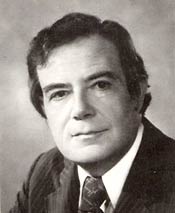Dr. James Grier Miller
Dr. James Grier Miller, the founding director of the U-M Mental Health Research Institute (MHRI), died Nov. 7 at his home in La Jolla, Calif. He was 86.

In 1955, Miller, who was then chairman of the Department of Psychology at the University of Chicago, accepted the invitation of Dr. Raymond Waggoner, chairman of the U-M Medical School Department of Psychiatry, to establish an interdisciplinary institute dedicated to the behavioral sciences, an advanced concept for the time. Miller traced his interests in the merging of biological and social sciences to his undergraduate days as a member of the Harvard Society of Fellows, and to the influence of Alfred Whitehead. At Chicago, Miller was stimulated to integrate the biological and social sciences through discussions with nuclear physicist Enrico Fermi, who felt that such advances were important for the survival of the human race in view of the development of the destructive force of nuclear explosions.
Miller’s ultimate, ambitious goal was to bring a variety of scientists to freely exchange ideas, and to reveal commonalities in the function and information processing of cells, organs, individuals, and societal groups and organizations. Miller brought with him from the University of Chicago the eminent Ralph W. Gerard, a neurophysiologist, and Anatol Rapoport, a mathematical biologist. Later, Robert I. Crane and Richard L. Meier, also from Chicago, joined the group. The broad interdisciplinary nature of the institute was reflected in the areas of expertise of its members, who also were appointed in diverse University units, including the Law School and the departments of political science, psychology, biological chemistry, sociology, urban planning and psychiatry. Miller proposed that “behavioral science” be a part of the institute’s name, but was persuaded by then-President Harlan Hatcher to use the words “mental health” as more suitable for continued financial support for the fledging institute. Miller initiated a new journal entitled “Behavioral Science” at the institute.
Miller left the institute in 1967 to pursue an administrative career, first as provost of the newly founded Cleveland State University, and then in 1973 as president of the University of Louisville, from which position he retired in 1980. Miller was succeeded at the MHRI by the late Gardner Quarton, then by the undersigned, and since 1995, by co-directors Stanley Watson and Huda Akil. Over the years, the institute has remained interdisciplinary but in a more restricted way, emphasizing neuroscience.
In 1978, together with his wife and collaborator Jessie, Miller made the case for a unified approach to the biological, psychological and social sciences in the book “Living Systems,” a compilation and synthesis that he regarded as the capstone of his career, 25 years in the making. Miller was regarded by his colleagues as learned, witty and, at times, controversial. He foresaw the role of computers as academic research tools, presaging the Internet by 10 or 20 years. Miller founded an educational computer network entitled EDUCOM, which eventually was incorporated into EDUNET. Following his move to California he became co-chairman of the Robert Maynard Hutchins Center for the Study of Democratic Institutions in Santa Barbara, held adjunct professorships at the University of California, Santa Barbara and UC, San Diego, and founded the University of the World, an international educational organization.
He was preceded in death by Jessie, his wife of 63 years, who died in July. They are survived by their sons, Dr. John Miller (Beverly Monts) of Indianapolis and Dr. Thomas Miller (Eleanor) of San Clemente, Calif., and by three grandchildren. Donations are suggested to charitable causes for the homeless, minority education and wildlife preservation.
Emily Gardner
Emily Gardner, retired from U-M since 1984, died in November at the age of “almost 82.” Raised in Tecumseh, Neb., she graduated Tecumseh High School with highest honors in 1938, and won a full scholarship to Vassar College, where she received her degree in political science in 1942. She came to Ann Arbor in 1957 and began a committed career with the University. She started as a staff benefits counselor, then served as a personnel representative/counselor and finally was one of U-M’s first personnel representatives for affirmative action/fair employment under the Office of the President. Her work required an unwavering presence of conscience.
She devoted much of her leisure time to U-M athletics and several local organizations, including Habitat for Humanity, the NAACP, and the Public Education Committee for Gender and Racial Equity. Over the years, she helped many second graders at the Wines Elementary School learn to read, and she actively pursued her passions for travel and gardening.
Many people’s lives within the University and greater Ann Arbor communities were touched by her devotion to equity and parity in education, job placement, supervision and compensation.
Her son, John Gardner, and daughter, Yael Goldenberg (King), will host an afternoon memorial tea on Saturday, Feb. 1. Those who had a connection with her are invited to join in honoring her special brand of energy and spirit while attending the tea. Memories are actively solicited. Contact [email protected] or (734) 995-8398.
—Submitted by Yael Goldenberg, daughter
The Record accepts obituaries and death notices from University departments, family
members and funeral homes acting on behalf of the family. All submissions must be for active or retired faculty and staff members.

